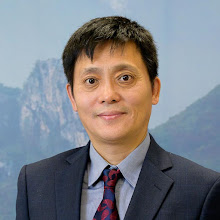Tiejun Tang
On 5th October
2015, the Chinese pharmacologist Youyou Tu was awarded the 2015 Nobel Prize in Physiology or Medicine for her discovery of artemisinin. As a traditional
Chinese medicine practitioner, I am very proud of this great achievement. It is
an historic breakthrough in at least three aspects: The first citizen of
People’s Republic of China to be awarded the Nobel Prize for science; the first
female Nobel Prize winner from China; the first Nobel Prize awarded to Chinese
herb research.
Artemisinin was extracted from the Chinese
herb Qinghao (Artemisia annua, English common name: Sweet Wormwood). It has
opened new way to battle malaria. This research started in the late 1960’s,
since when, Ms
Tu has studied and reviewed 2,000 ancient herbal formulae from the Academy of
Traditional Chinese Medicine in Beijing. She found a record referring to the
treatment of malaria from a classic text from 1,600 year ago (during the East Jin
Dynasty). It recommended soaking sweet wormwood (Artemisia annua) in water and
drinking the resulting infusion. Ms Tu invented ether extraction of Qinghao and
significantly increase the effect of artemisinin. This great invention had
saved more than a million lives in Africa. It is a milestone in the treatment
of malaria. Through over 40 years of concerted
effort by an entire research team, this research has been awarded the highest
accolade of scientific research.
At the Awards ceremony, a Chinese journalist
asked: “Can we say this is the first time in you
award to traditional Chinese medicine, and can you comment on the contribution
to this field?” Mr.Hans Forssberg of the
Nobel Prize committee said: “It is very important that we are not giving prize to traditional
medicine. We are giving prize to person inspired by traditional medicine and
who has been able to make new drug that can be distributed all over the world.” I think the most important step is the “inspired by traditional medicine”.
There are thousands of medicinal herbs in the world. Finding an effective herb
for malaria is like searching for a needle under the sea. Only under the
guidance of Traditional Chinese Medicine’s classical texts and the clinical
experience of 1600 years, was Youyou Tu able to find the critical inspiration
to make her discovery.
Qinghao (Artemisia
annua) is one of my favourite herbs in my practice. It not only provides
effective treatment for malaria but also is used to good effect on the symptoms
of menopause. Within the practice of traditional Chinese medicine, the symptoms
of hot flushes and night sweats are due to yin deficiency and I often use
Qinghao to clear the heat which causes these symptoms. It has always shown significant positive
effects.
Traditional Chinese
medicine is a great treasure of the world. The discovery of artemisinin has merely scraped the tip of the iceberg. I believe more and more great discoveries in Chinese medicine
research will come in the future.

